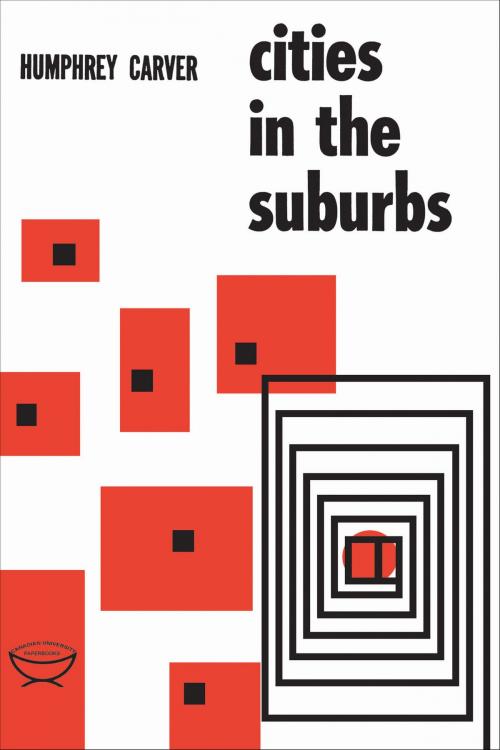| Author: | Humphrey Carver | ISBN: | 9781442654501 |
| Publisher: | University of Toronto Press, Scholarly Publishing Division | Publication: | December 15, 1962 |
| Imprint: | Language: | English |
| Author: | Humphrey Carver |
| ISBN: | 9781442654501 |
| Publisher: | University of Toronto Press, Scholarly Publishing Division |
| Publication: | December 15, 1962 |
| Imprint: | |
| Language: | English |
We are all familiar with the almost ritual lament about the desolation and sameness of the suburbs that surround our modern cities. Is this complaint inevitable or can something be done to lend variety, colour, and meaning to these spreading areas? In a book full of good questions and apt illustrations, Mr. Carver examines what has provided a sense of community for city groupings of the past and how leading planners of our day (Ebenezer Howard, Frank Lloyd Wright) have suggested it be found for modern cities.
His own proposal for achieving this goal is a very simple one and originates in the earlier views of a city as a place in which an urban society achieves its individual character by congregating around its own social institutions. Somehow today we have to recover this simple idea about a city and apply it to the contemporary sprawling urban region.
"The exposing metropolis" is a good descriptive term for the modern city, with its social institutions removed from the original centre and scattered into the suburbs. Now we should try to rearrange suburban growth so that each new community can grow up around its own vigorous and attractive "Town Centre," a place that can command the interest and pride of those who live immediately around it. These small cities in our suburbs would not just be dormitories for their central core city, but rather communities in their own right and the new kind of town centre would give a focus for their social, political, and cultural life.
The idea of metropolitan or regional government for large urban areas has been much debated in Canada. But there has not been a clear view of how such governments could give birth to new daughter communities around them. The establishment of new "Town Centres" in growing suburban areas would be a workable method of helping these new settlements through a period of growth. Housing and commercial developments would then be able to gather in an organized fashion around the focal point in a regional plan. It is hoped this suggestion will be taken up by local politicians and their professional staffs but they cannot steer towards long-term objectives of this kind unless the general public understands the general philosophy involved.
This is a lively book, hopeful in its suggestions and cheerful in its phrasing, and it should provoke eager discussion. It is illustrated with unusual line drawings to point up the argument and with many photographs.
We are all familiar with the almost ritual lament about the desolation and sameness of the suburbs that surround our modern cities. Is this complaint inevitable or can something be done to lend variety, colour, and meaning to these spreading areas? In a book full of good questions and apt illustrations, Mr. Carver examines what has provided a sense of community for city groupings of the past and how leading planners of our day (Ebenezer Howard, Frank Lloyd Wright) have suggested it be found for modern cities.
His own proposal for achieving this goal is a very simple one and originates in the earlier views of a city as a place in which an urban society achieves its individual character by congregating around its own social institutions. Somehow today we have to recover this simple idea about a city and apply it to the contemporary sprawling urban region.
"The exposing metropolis" is a good descriptive term for the modern city, with its social institutions removed from the original centre and scattered into the suburbs. Now we should try to rearrange suburban growth so that each new community can grow up around its own vigorous and attractive "Town Centre," a place that can command the interest and pride of those who live immediately around it. These small cities in our suburbs would not just be dormitories for their central core city, but rather communities in their own right and the new kind of town centre would give a focus for their social, political, and cultural life.
The idea of metropolitan or regional government for large urban areas has been much debated in Canada. But there has not been a clear view of how such governments could give birth to new daughter communities around them. The establishment of new "Town Centres" in growing suburban areas would be a workable method of helping these new settlements through a period of growth. Housing and commercial developments would then be able to gather in an organized fashion around the focal point in a regional plan. It is hoped this suggestion will be taken up by local politicians and their professional staffs but they cannot steer towards long-term objectives of this kind unless the general public understands the general philosophy involved.
This is a lively book, hopeful in its suggestions and cheerful in its phrasing, and it should provoke eager discussion. It is illustrated with unusual line drawings to point up the argument and with many photographs.















